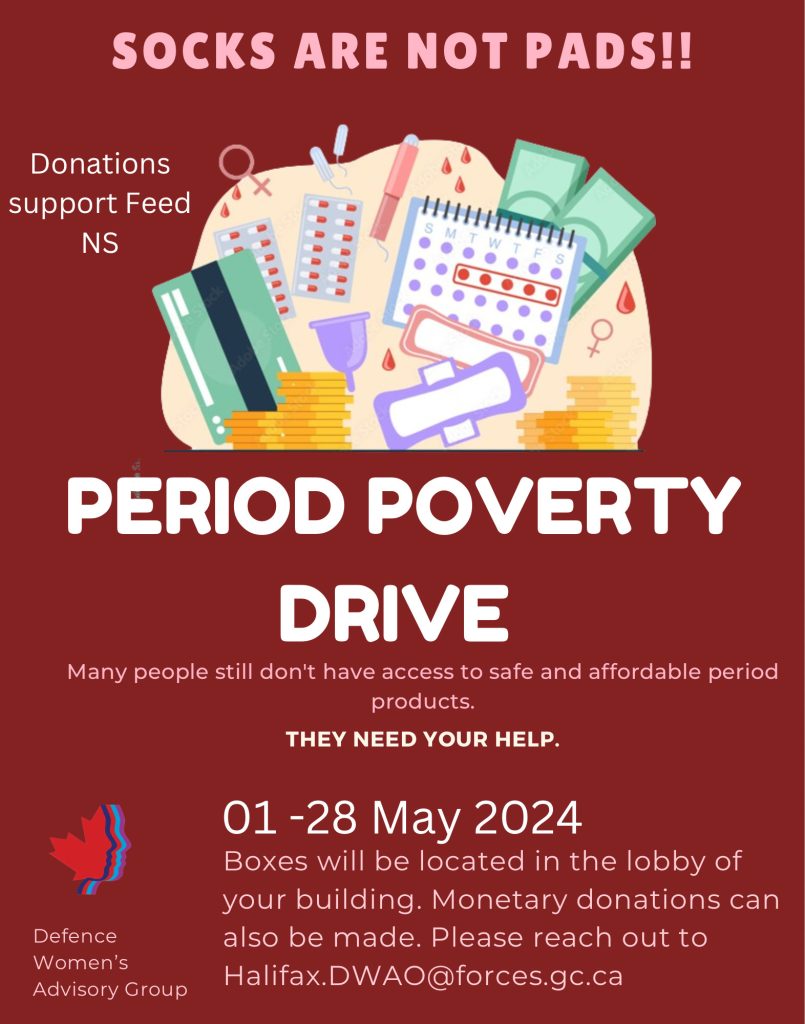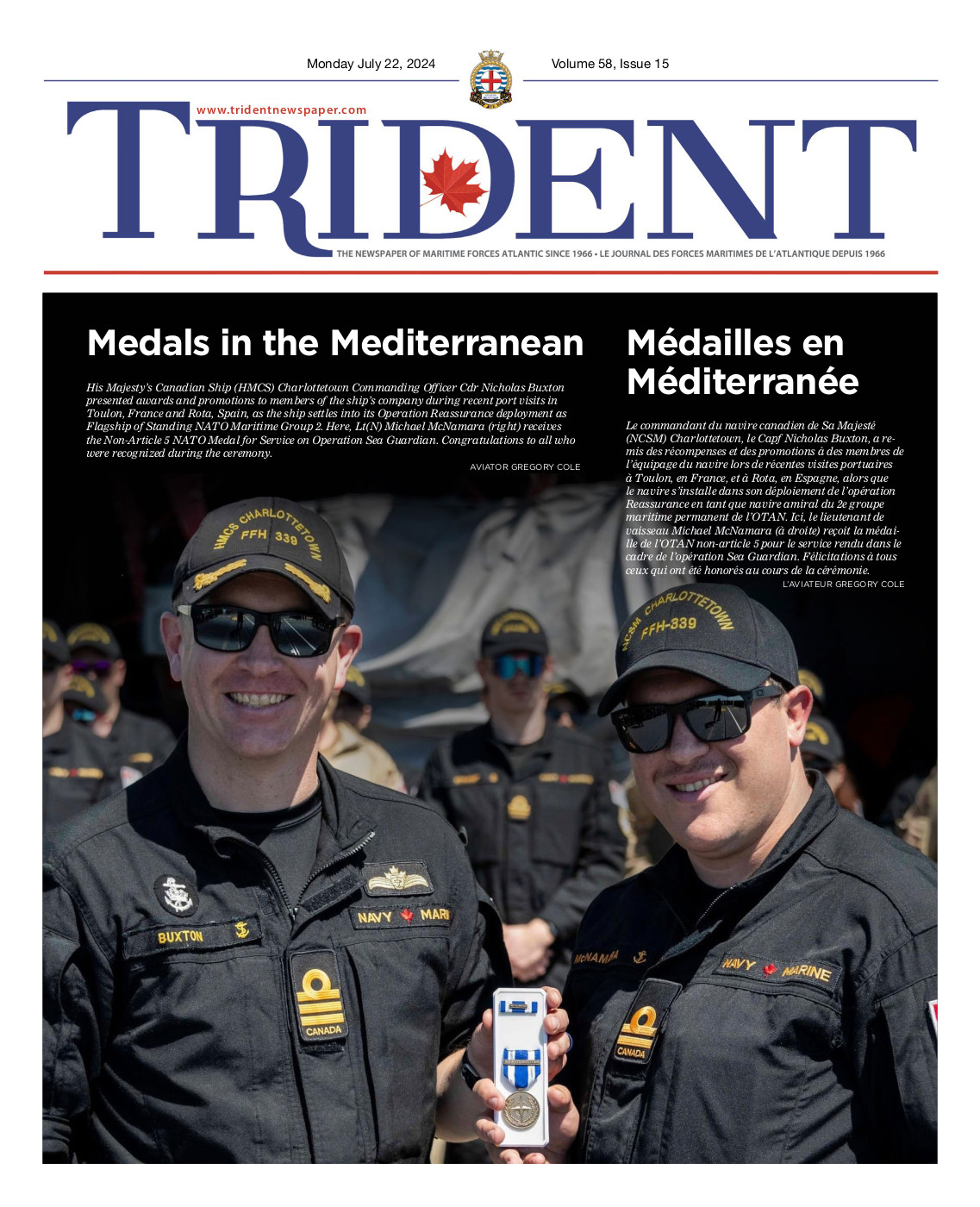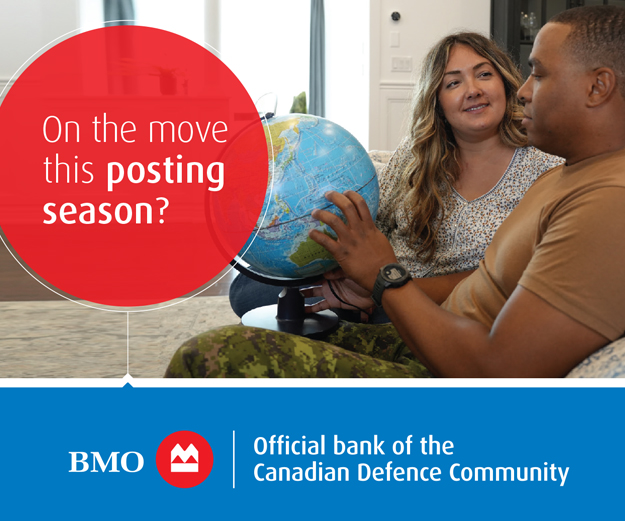Campaign to combat period poverty runs through May
By Kim Roberge
Civilian Co Chair, DWAO Halifax

CFB Halifax, 12 Wing Shearwater and the Defence Women’s Advisory Organization have kicked off their annual Period Poverty Drive in support of Feed Nova Scotia.
Each May, in recognition of Menstrual Hygiene Month (May 28 is International Menstrual Hygiene Day), boxes are distributed around the bases in multiple buildings – donations of new, unopened menstrual products can be dropped inside. Tampons, sanitary pads, menstrual underwear, diva cups, and wipes are some items that are normally donated. We are looking forward to having another successful year, striving to collect even more than last years’ campaign, which saw us deliver more than 25,000 products to those in need.
The Defense Women’s Advisory Groups can be found at bases across the country, with mandates to assist the DND/CAF senior leadership and personnel in establishing a more equitable work environment and enhancing career opportunities by identifying systemic issues and advising on policies. We are an avenue for both civilian and military women to have access to an advocacy group that ensures they are included in policies and initiatives. The organization is composed of both military and civilian co-chairs at the national and regional levels. The DWAO is not just for women, but everyone who wants to make a positive impact. CFB Halifax/CFB Shearwater share a combined 200 volunteer members that make up this incredible group, and membership continues to grow.
In Canada, period poverty persists as a pressing issue, affecting the health and dignity of women and girls across the country. Despite continuing strides in gender equality, access to menstrual products remains unequal, leaving many unable to afford or access essential items. Among adults aged 18-70, Canada ranks in the bottom half of countries surveyed with respect to society’s support of talking openly about periods.
Recent studies reveal alarming statistics. According to Plan International Canada, one in three Canadian women under 25 has struggled to afford menstrual products. This financial strain often forces individuals to make sacrifices to purchases menstrual supplies, or to resort to using improvised materials like toilet paper, socks, or even newspaper, old rags, or cotton batons, posing health risks and eroding dignity. The problem extends beyond mere affordability — Indigenous communities, remote regions, and marginalized groups face compounded challenges due to limited access to stores and resources. Those in remote areas can expect to pay close to double compared to their counterparts in more populated regions. One in five (22 percent) ration or use products longer than they should because they can’t afford more. This rises to 33 percent among those with a household income of under $50,000, and 48 percent for Indigenous respondents.
Additionally, the stigma surrounding menstruation exacerbates the issue, leading to silence and shame that further restrict access to support. Studies have shown 45 percent of Canadians think periods make people weaker.
Recognizing the urgency of addressing period poverty, various initiatives have emerged. Advocacy groups, nonprofits, and government programs have mobilized to provide menstrual products to those in need. Some cities, like Vancouver and Halifax, have taken progressive steps by implementing free menstrual product programs in public spaces like libraries and community centers. School boards across the country have all implemented some type of access to these products at no charge to students. Alliances were made with companies like Shoppers Drug Mart but will only be valid if the government continues to support them. For example, school boards in Ontario are currently fearing what will happen when their contract runs out at the end of 2024.
These efforts highlight the need for systemic change. Calls for policy reforms to classify menstrual products as essential items, thus exempting them from sales tax, have gained traction. Furthermore, comprehensive education on menstrual health and destigmatization initiatives are crucial to fostering understanding and empathy.
Sadly, menstrual education is not as common or thorough as it should be. 58% of young girls report losing their confidence at puberty, and starting their period marks girls’ lowest point in confidence during their teenage years. Even today, there are young girls who are not prepared for how their body is going to change, with 79 percent of teens feeling they lack proper education on menstrual health. On the other end of the spectrum is a similar lack of education regarding perimenopause and menopause in the later years of life.
As Canada strives for gender equality, tackling period poverty stands as a pivotal challenge. Ensuring universal access to menstrual products not only upholds the rights and dignity of women and girls, but also advances the nation’s commitment to equality and social justice.





